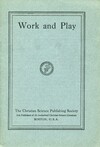

Are you sure?
This bookmark will be removed from all folders and any saved notes will be permanently removed.
Holidays
To the popular mind a holiday means a day of rest from labor, or a day of amusement. But what is the original meaning of the word? Holy day, that is, a "consecrated day," says Webster, who defines holy as "set apart to the service or worship of deity." Such holidays are desirable indeed and are available to all at any season of the year. Any day given even in part to the contemplation of things of the Spirit is a holy day. Any day in which we draw nearer to God in our thought, thus drawing farther away from matter, becomes to that extent a holy day. "Who did hinder you that ye should not obey the truth?" Nothing can hinder us, neither long hours, difficult work, personality, nor bodily conditions. Holidays are at the service of all who care to avail themselves of them, yea, three hundred and sixty-five a year!
Perhaps you hear some one saying, "That's all very fine, metaphysically speaking, but as long as we are in this body we must have rest and amusement." Very true. We should have rest and peace and joy without stint, pressed down and running over. But no one can possibly maintain, that the physical body, matter, can experience rest or happiness. Feeling being entirely mental, such states must be mental So the question arises, What will bring these blessings into our experience? Will a condition of complete inaction, that is, insensibility, provide the rest wanted? Obviously not. One will have to be conscious in order to know and enjoy the consciousness of rest. Therefore thought must be active, but active in the right way,—that is, harmonious, joyous, alert, without friction, worry, or apathy. Now all who have sipped at the fountain of Truth know right well that such a state can only be won in "the service or worship of deity," that no amount of travel, scene shifting, labor changing, or amusement can bring it. "The kingdom of God is within you," and one has only to enter into his closet and pray, to prove that this is so. Mrs. Eddy says, "God rests in action" (Science and Health, p. 519). Being which neither slumbers nor sleeps, as the Scriptures aver, but is omniactive Life, Truth, Love, must be always "at rest," that is, harmonious, complete.
Then again Jesus says, "Come unto me, all ye that labour and are heavy laden, and I will give you rest," and yet he was the busiest man that the world has ever known, giving scant time to sleep and food and recreation He must have been resting in action; finding that, as Mrs. Eddy states in the paragraph already quoted from, "the highest and sweetest rest, even from a human standpoint is in holy work." In short, he was about his Father's business. Ah, that is rest and joy indeed, the joy that "no man taketh from you," the joy of our Lord. Will you seek it at the sea beach, on the forest trail, in the palatial hotel? Will you discover it in any or all of the broad and easy ways of the five physical senses? Will you find it in person, place, or time? Mrs. Eddy answers clearly (Science and Health, p. 60): "Higher enjoyments alone can satisfy the cravings of immortal man. We cannot circumscribe happiness within the limits of personal sense. The senses confer no real enjoyment."
Enjoy 1 free Sentinel article or audio program each month, including content from 1898 to today.
JSH Collections
This article is included in:
1921 - PAMPHLET
Work and play
JSH-Online has hundreds of pamphlets, anthologies, and special editions for you to discover.

January 22, 1921 issue
View Issue-
Success
ALDEN F. POTTER
-
"Greater love hath no man"
HAZEL L. ZIMMERMAN
-
Joy
LESLIE M. KNAPP
-
Holidays
LLOYD ROBERTS
-
Hope Unbound
MAUD W. MAKEMSON
-
True Labor without Self-Righteousness
ADELAIDE SINGLETON
-
The First Commandment
FRANK BARNDOLLAR
-
The New Year
LENA M. HALL
-
Responsibility
Frederick Dixon
-
Eyes and Ears
Gustavus S. Paine
-
Assurance
FLORA F. GOOCH
-
Some time ago I found myself, according to the human...
Herbert Watson
-
Five years ago last November I turned to Christian Science...
Lalla E. Morris
-
It is with deep gratitude that I send this testimony to...
Robert E. Hobbs
-
It would be very ungrateful of me to wait any longer...
Eliza C. Moulton
-
About seven years ago, very shortly before a child was...
George C. Putnam
-
One of the greatest blessings that has come to me through...
Grace Margaret Watterson
-
I have decided to make a public answer to a question...
Druie E. Thompson
-
It is a wonderful thing after years of weakness, unrest,...
Ethel Adele Denny
-
In "Science and Health with Key to the Scriptures"...
Jennie Hunter
-
Signs of the Times
with contributions from Robert Donald, F. O. Seamans, Ellis Paxson Oberholtzer, John Henry MacCracken, Charles Stelzle, Sacramento, Clay MacCauley


